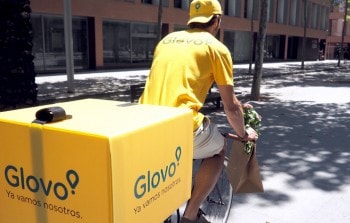European on-demand delivery startup Glovo raises €30 million Series B

May 4, 2020
Europe

Late last month, Spanish media got wind that the Barcelona-based on-demand delivery app Glovo had closed Series B funding, but now the company is making the news official.
The startup, which offers a service similar to Postmates in the U.S., has raised a €30 million round led by Rakuten Capital, and Cathay Innovation. Existing investors Seaya Ventures, Entreé Capital, Caixa Capital Risk, and Bonsai Venture Capital also participated.
Founded in January 2015 by Oscar Pierre and Sacha Michaud, Glovo offers a ‘shop on your behalf’ app that promises to let you order anything locally on-demand and have it delivered “within minutes”. This includes food items — the company is McDonald’s’ official delivery partner in a number of Spanish and Italian cities — but also non-food items. In August last year, Glovo CEO Oscar Pierre told me that the latter, such as electronics and pharmaceuticals, made up 50 per cent of orders.
Regards the Series B funding, Glovo said it will be used to strengthen its market position, and continue to invest in its technology platform and to “optimize the synergy between the three pillars of the marketplace: users, glovers and stores”. The startup has also recruited Niall Wass, who was previously in charge of leading the international expansion at Uber across more than 50 countries, as an advisor and to help with Glovo’s own international ambitions.
The delivery app is already available in Barcelona, Madrid, Valencia, Zaragoza, Seville, Malaga, Palma de Mallorca, Bilbao, Rome, Milan and Paris. It claims 250,000 users and 3,000 partners, whilst I’m told that in July the platform passed one million orders and is on track to surpass its 2 millionth order before the end of the year.
As a footnote, London-based Jinn, which competed directly with Glovo, recently pulled out of Spain as part of a “pausing” of all operations outside of the U.K. capital city. Asked to comment, Glovo co-founder Sacha Michaud said: “They were finding it difficult to get traction in the Spanish market, I think focusing on their largest market makes sense at this point”.